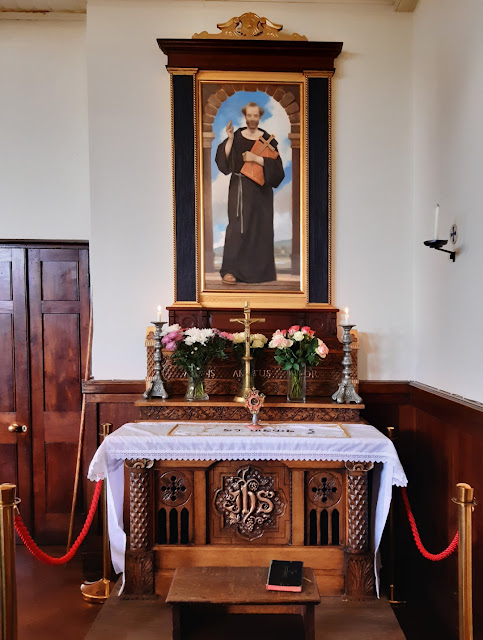Salvation our primary concern
I thought you might be interested in the sermon I will be preaching this Sunday as it touches on some matters that I have raised recently in this blog.
“Your faith has saved you; go in peace” (Luke 7.50)
The story of the repentant woman who is forgiven by our Lord is very moving. Our Lord restores the woman’s self-respect which has been lost with her reputation and offers an analysis of his action to his friend, the Pharisee Simon, that will cause him and countless others after him to examine their conscience and begin to root out the capital vice of pride.
A modern reading of this episode might well stop there. However, the gospel account ends with our Lord’s proclamation of the woman’s salvation “Your faith has saved you; go in peace.” This turns out to be the essential outcome of her encounter with Christ.
It is worth reflecting on this in relation to our own work in the parish. People often say to me that the parish is a good one and I like people to say this: it brings a sense of, I think, legitimate pride – I am aware that there are many things that we could do much better.
But the other day, I was being interviewed for a programme to be broadcast on EWTN and the interviewer spoke of the parish and asked about its “success.” I think it was a light given by the Holy Spirit which prompted me immediately to say that I will only know whether the parish has been a success at the last judgement when our Lord will show me how many parishioners have been saved.
Our “success” or “failure” as a parish is not measured by how we feel or how much money we raise or how many activities we can arrange. The true success of all our endeavours in the Church will be measured by how many of us are saved and go to heaven. A consequence of this view of “success” in a parish is that all our activities should be directed towards this final end.
In fact, the ordinary things that are done well here (and can always be done better) are not irrelevant to this end. A parish where people feel welcomed, where there are activities for people of all ages, where we are able to keep the buildings in good order, will be more likely to help people to get to heaven than one which is neglected or unfriendly. Therefore it is right that we should try to be more welcoming, offer more activities for people, and involve more people, in other words to try to do better the things that we sometimes do quite well.
Nevertheless, we should always keep in mind the real point of existing as a parish in the Catholic Church. In the end it is not so that we can feel good about ourselves, it is so that we can help one another to live the Christian life as well as possible, keep the commandments, pray devoutly and regularly, frequent the sacraments of Confession and Holy Communion, and especially foster vocations: both to Christian marriage lived according to the teaching of the Church and to the priesthood and the religious life.
Parish activities usually begin and end with a prayer. That is how it should be. We should never see this as a token gesture indicating that our activities are Catholic rather than run by, say, the local Council. Committing all our activities to the care of our almighty Father and our patron, the Blessed Virgin Mary, reminds us that the ultimate reason for any of our activities is that we should help one another to get to heaven.
Our secular government has recently decreed that religious charities must prove that they provide some “public benefit” apart from “advancement of religion.” The Bishops have quite rightly expressed concern about this and I have tried to do so myself through my own writing.
Reflecting on today’s beautiful gospel, we can see that our priorities are diametrically opposite to those expressed by the Charities Commission. For us, the “advancement of religion” is the supreme public benefit. It is ordered to the salvation of souls and not merely the increase of temporal benefit in this world, whether physical or psychological. If, please God, we do bring benefits to the public, we do so because we because we wish to follow the command of Christ that we should love our neighbour, and because we believe that anything done for the least of his brothers or sisters is done for him.
The Charities Commission may be right in one respect. The public benefit that the “advancement of religion” brings may not be measurable by secular standards. Indeed it may never be seen this side of the last judgement.
“Your faith has saved you; go in peace” (Luke 7.50)
The story of the repentant woman who is forgiven by our Lord is very moving. Our Lord restores the woman’s self-respect which has been lost with her reputation and offers an analysis of his action to his friend, the Pharisee Simon, that will cause him and countless others after him to examine their conscience and begin to root out the capital vice of pride.
A modern reading of this episode might well stop there. However, the gospel account ends with our Lord’s proclamation of the woman’s salvation “Your faith has saved you; go in peace.” This turns out to be the essential outcome of her encounter with Christ.
It is worth reflecting on this in relation to our own work in the parish. People often say to me that the parish is a good one and I like people to say this: it brings a sense of, I think, legitimate pride – I am aware that there are many things that we could do much better.
But the other day, I was being interviewed for a programme to be broadcast on EWTN and the interviewer spoke of the parish and asked about its “success.” I think it was a light given by the Holy Spirit which prompted me immediately to say that I will only know whether the parish has been a success at the last judgement when our Lord will show me how many parishioners have been saved.
Our “success” or “failure” as a parish is not measured by how we feel or how much money we raise or how many activities we can arrange. The true success of all our endeavours in the Church will be measured by how many of us are saved and go to heaven. A consequence of this view of “success” in a parish is that all our activities should be directed towards this final end.
In fact, the ordinary things that are done well here (and can always be done better) are not irrelevant to this end. A parish where people feel welcomed, where there are activities for people of all ages, where we are able to keep the buildings in good order, will be more likely to help people to get to heaven than one which is neglected or unfriendly. Therefore it is right that we should try to be more welcoming, offer more activities for people, and involve more people, in other words to try to do better the things that we sometimes do quite well.
Nevertheless, we should always keep in mind the real point of existing as a parish in the Catholic Church. In the end it is not so that we can feel good about ourselves, it is so that we can help one another to live the Christian life as well as possible, keep the commandments, pray devoutly and regularly, frequent the sacraments of Confession and Holy Communion, and especially foster vocations: both to Christian marriage lived according to the teaching of the Church and to the priesthood and the religious life.
Parish activities usually begin and end with a prayer. That is how it should be. We should never see this as a token gesture indicating that our activities are Catholic rather than run by, say, the local Council. Committing all our activities to the care of our almighty Father and our patron, the Blessed Virgin Mary, reminds us that the ultimate reason for any of our activities is that we should help one another to get to heaven.
Our secular government has recently decreed that religious charities must prove that they provide some “public benefit” apart from “advancement of religion.” The Bishops have quite rightly expressed concern about this and I have tried to do so myself through my own writing.
Reflecting on today’s beautiful gospel, we can see that our priorities are diametrically opposite to those expressed by the Charities Commission. For us, the “advancement of religion” is the supreme public benefit. It is ordered to the salvation of souls and not merely the increase of temporal benefit in this world, whether physical or psychological. If, please God, we do bring benefits to the public, we do so because we because we wish to follow the command of Christ that we should love our neighbour, and because we believe that anything done for the least of his brothers or sisters is done for him.
The Charities Commission may be right in one respect. The public benefit that the “advancement of religion” brings may not be measurable by secular standards. Indeed it may never be seen this side of the last judgement.


